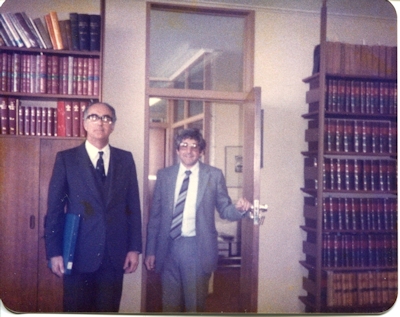I.G. Farlam
I was watching news on TV recently when an item was broadcast about the commission in South Africa conducting an enquiry into the shooting of miners by the police at Marikana. As the item ended it showed a glimpse of the Chairman of the enquiry. I recognised him instantly — especially those raised eye brows and that twinkle in the eye. It was, as I confirmed by a search on the Internet, Mr Ian Farlam. See this link to the Commission's website. He was our senior advocate at the 1984 stage of the first Cape Town case (not, however, in 1985 when the final hearing was held).
In October 1984, the late Maulana Hafiz Sher Mohammad sahib and I used to go to his office almost daily to brief him and his junior counsel. One day I took a photo of the two counsels in his office, which I display below, in which Mr Farlam is on the left.
One day when we went to his office, we discovered that the attonery for the opposite party had sent our counsel a copy of the 1984 Federal Shariat Court judgment in Pakistan, which upheld that the Pakistan government had been right to declare Ahmadis as non-Muslim. This had been brought by the eminent Pakistani witnesses against us who had come to Cape Town to help the defendants. Our counsel were deeply worried, seeing "Shariat Court Judgment" written on the cover page of this thick, impressive looking volume. But as they studied it over the next few days (and I used to translate parts of it into Urdu for Hafiz sahib) they were astonished to find that the judge's comments were simply a travesty of justice. Our worry was removed because the courts in South Africa were not going to take this laughable document seriously.
When the hearing began in November 1984, this was when the defendants applied for the question to be determined "whether or not the Court should decline to hear the merits of the dispute as to whether Ahmadis are Muslims or not", the reason they advanced being that a secular court could not adjudicate on religious issues, and that it should accept the decisions of the Muslim bodies which had declared Ahmadis as non-Muslim. After three days of legal arguments, the judge reserved his judgment, which he delivered in July 1985, rejecting the defendants' arguments.

According to an article published by BBC Urdu the total number of Ahmadiyya community in India is One hundred thousand.…
----Jul 27, 18:49